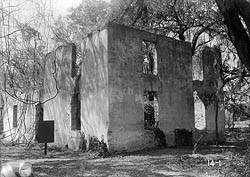“Early in August, disease made its appearance among us. Several were attacked by the ague, with its accompanying fever; but in South Carolina, the “ague” as it is called is scarcely regarded as a disease, and if a slave, has no ailment that is deemed more dangerous, he is never withdrawn from the roll of the field hands. I have seen many of our poor people compelled to pick cotton, when their frames were shaken so violently, by ague, that they were unable to get hold of the cotton in the burs, without difficulty. In this, their masters commit a great error. Many fine slaves have been lost, by thus disease, which superinduces the dropsy, and sometimes the consumption, which could have been prevented by arresting the ague at its onset. When any of our people were taken so ill that they were not able to go to the field, they were removed to the great house, and placed in the “sick room” as it was termed. This sick room was a large airy apartment, in the second story which stood in the garden… I was several times in the “sick room,” and always observed when there, that the sick slaves were well attended to. There was a hanging partition, which could be let down at pleasure, and which was let down when it was necessary to divide the rooms into two apartments, which always happened when there were several slaves of different sexes, sick at the same time. The beds, upon which the sick lay, were of straw, but clean and wholesome, and the patients when once in this room, were provided with every thing necessary for persons in their situation. A Physician attended them daily, and proper foods, and even wines, were not wanting.
The contrast between the cotton and rice fields, and this little hospital was great; and it appeared to me at the time, that if a part of the tenderness and benevolence, displayed here, had been bestowed upon the people whilst in good health, very many of the inmates of this infirmary, would not have been there. (Ball, 1837:207–208).


